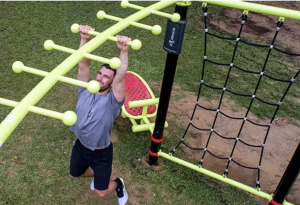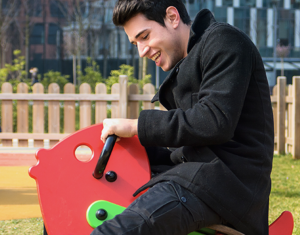What if I told you that there are findings indicating play is a basic human need?
Researchers are making the case that play is vital to our lives – even as adults. According to HelpGuide.org, we don’t need to make adult life all about work. Let me be clear. No, a group of friends out together with everyone glued to their digital devices is NOT play.
According to National Geographic writer Sadie Dingfelder, “We need play, seriously. Adults tend to dismiss it as silly or childish, but having fun may be fundamental to the survival of our species.” The article goes on to say we’ve suppressed our natural play instinct.

To get a little weighty National Geographic shared that in the summer of 2023 scientists found that the play drive originates in our brain stem- in terms of evolution, one of the oldest parts of our nervous system. The article states that a rat’s entire cerebral cortex can be removed and it will still play.
Dingfelder observes, “Playfulness helps young animals master their bodies and their environment. Once they do most animals stop playing. Others don’t; wolves, crows, dolphins, monkeys, humans and other primates. She writes biologists are just beginning to understand why that is. “One possibility is that adult play can lead to useful discoveries.” This theory is supported by the research of Camilla Cenni in her doctoral thesis.
Dr. Stuart Brown is a longtime play researcher and trained psychiatrist. In an interview on NPR’s All Things Considered he explained to host Pien Huang, “It is as basic as sleep and nutrition. It doesn’t produce the same outcome as hunger or fatigue, but the need to play is there in all of us.” He goes further by stating, “The opposite of play isn’t work, it’s depression. The adult play deficit is becoming a national health crisis.”

And yes, there is a National Institute for Play (nifplay). They point out that adult play isn’t always obvious. And, adults do reach the “play state” as easily as little children. Also, according to the National Institute for Play, “Sometimes what adults think of as play is anything but, and thing we may think of as difficult like writing a book or a jigwaw puzzle are actually play.” Nifplay says, “The instinct to play is built into our biology. “And the “play circuits” in our brains are unique.
According to Peter Gray, author of Free to Learn, “The characteristics of play have to do with motivation and mental attitude.” He gives the example of two people throwing a ball –for one it may be play for the other not. “To tell which one is playing you have to infer from their expressions, details of their actions, why they are doing it and attitude towards it.”
Somewhere between childhood and adulthood we generally stop playing. HelpGuide.org says we are more likely to zone out in front of a TV or a computer (I’d add to that a smartphone or any other electronic device) rather than fun rejuvenating play activities -engaging real-time in person with others- like we did as children.
While play is crucial to the development of children it is also for people of all ages. Benefits include relieving stress, brain stimulation, supercharging learning and connecting you with others and the world around you.
PsychCentral says adult play not only reduces stress it helps adults cope better with stress, boosts creativity and sharpens your sense of humor. According to PsychCentral a group of researchers had individuals rate themselves on five types of playful behavior; spontaneous, expressive, creative, fun and silly. They found higher “playfulness scores” to be associated with;
- Higher creativity
- Appreciation of beauty
- Approaching life with excitement and energy
- Playful expressions of love
- Sense of hope
- Sense of humor
Miracle Recreation, whose core business is designing and building playground structures for children, has branched into doing so for adults and active seniors. They also point out that for adult play personal social interaction is key. And they say adult play can take the form of organized sports, murder mystery parties and board game nights. I’d add escape rooms and laser tag as well as physically invigorating activities with children,- bike riding, skating, skiing, hiking, sports.
They point out it is possible to combine your adult play with physical fitness. In particular Miracle Recreation points out that outdoor play in the form of outdoor physical fitness will increase your motivation, raise self-esteem, boost your mood and lower negative emotions while connecting you to nature and helping you stick to your goals.

thegeniusofplay.org
According to Newsweek, “the average American now logs more hours of work than a 14th-century English peasant.” This trend was well on its way before the pandemic. Dr. Kathy Hirsh-Pasek author and a senior fellow at the Brookings Institute, believes the pandemic may have changed the trend in a positive way. She believes the pandemic may have pushed already work-weary Americans over the brink to the point we are revising our attitudes toward work and play. She says, “People need to enjoy their lives.”
According to her, since the pandemic, there are signs of positive trends toward adult play; 50 million people quit their jobs, adults are turning to puzzles and coloring books with a fervor, and starting to play with Legos. And summer camps for adults for everything from hiking, zip-lining to cooking and painting have proliferated.
And Dr. Hirsh-Pasek is also encouraged by another trend. Even as children and teens are increasingly tethered to screens and all forms of digital devices educators, teachers and policymakers are increasing focused on kids learning through physically and intellectually stimulating hands-on play.
Start making time to play. Do so on your own, with friends, family, new social connections. It’s offers tangible benefit for your physical and mental health. Besides …. All work and no play …..
The website thegeniusofplay.org list tips to help adults be more playful such as;
- Use unscheduled time to be creative, daydream, decompress
- Try new things and embrace the unexpected
- Look for and participate in a variety of arts/sports and group activities
- Sing and dance just for fun
- Spend time with children in your life observing their play and listening to their conversations
- Plan to make play part of your day inside, or out
- Take up new hobbies or re-engage with old ones
